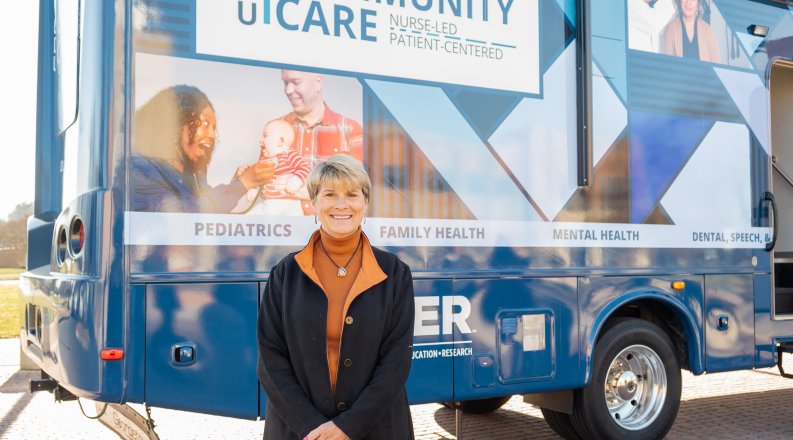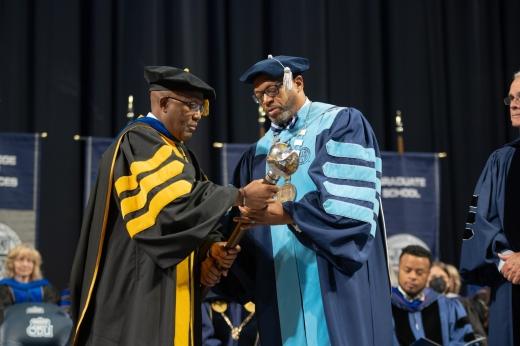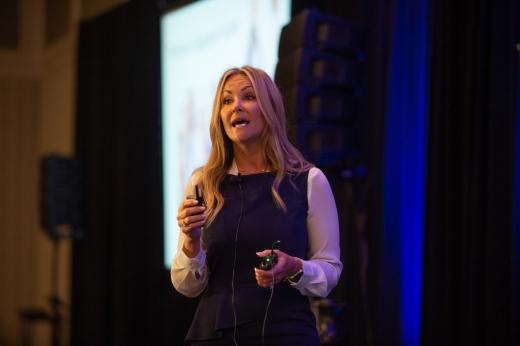By David Simpson
Having been a nurse practitioner for more than 30 years, Carolyn Rutledge is all for hands-on health care. But she's also a leading advocate for the hands-off kind.
The Old Dominion University professor of nursing is a recognized expert in telehealth - the use of digital information and communication technologies to deliver health care services remotely. And her 2020 book "Telehealth Essentials for Advanced Practice Nursing," co-written with Patty Schweickert, "has become a sought-after text in nursing education programs," she said.
At 4 p.m. Nov. 2 at the University Theatre, Dr. Rutledge will be the guest of honor for the fall 2022 Provost's Spotlight (details below).
At ODU, she is associate chair of the School of Nursing, director of the doctor of nursing practice program and academic director of the Center for Telehealth Innovation, Education and Research.
What's more, she is a professor of family medicine at Eastern Virginia Medical School, where she maintained a clinical practice as a family nurse practitioner for 32 years.
She holds a Bachelor of Science in nursing from the Medical College of Virginia, and a Master of Science in nursing in the family nurse practitioner track and a Ph.D. in health services research, both from ODU.
Ahead of the Provost's Spotlight, Rutledge took time out to answer a few questions. This interview has been edited for length.
Where were you born and where did you grow up?
I was born in St. Clair, Michigan. My parents were stationed in Michigan after my father was drafted into the Army. They lived in a small house trailer in an Army community, with their closest family being in Virginia. My mother had not even held a baby until she had me. We moved back to Virginia when I was about 18 months old. I grew up in rural central Virginia on a farm with my parents and three younger brothers.
What drew you to nursing and to academia?
Growing up on a farm, I at times encountered sick or injured animals. I loved caring for them and realized I would be best suited for a health care field. At first, I wanted to be a veterinarian. But I soon realized that I wanted a broader field and saw that nursing offered the greatest opportunity for a diverse profession. Initially, I worked with terminally ill children at Duke University and then children in the ICU at MCV/VCU. After my husband became a military dentist, we were stationed in West Berlin from 1982 to '85. I worked in the military hospital in the newborn nursery and on the adult surgery floor caring for military servicemen and their families. But being a nurse with a military spouse prevented me from acquiring seniority and had me working nights at each place we were stationed. While struggling with the night shift and the lack of daylight in winter, I was asked to run the EMT training program in Berlin - where I would be responsible for educating soldiers and their spouses. Through this job I realized I loved teaching and could have an even greater impact on those in need through the students I taught. Since then, I have consistently held positions that combined clinical practice and academia. Nothing makes me happier than seeing students achieve their goals and have an impact on society.
What drew you to telehealth? Did you have an "aha" moment?
My venture into telehealth began in 2010 when I wrote a grant for the U.S. Health Resources and Services Administration. The grant was seeking education for nurse practitioners in interprofessional care. The goal was to develop collaborations between nurse practitioners and other health care professions to improve care to rural and underserved populations. I found this to be an odd request because we were educating many of our nurse practitioners through a hybrid approach to keep them in the rural and underserved regions. It was important that they stay in these regions to be the provider - often the only provider for miles. It seemed like a waste to educate our nurse practitioners in interprofessional care if they were going to provide care where there was such a lack of other professions. I decided to add telehealth to my grant proposal so the nurse practitioners and other health care professions could learn to collaborate at a distance. In this way, we would prepare our students and other health care providers to use technology to overcome the barriers of access to health care. HRSA was interested in our unique idea and ended up sending a team to observe what we had created. Since then, they have consistently required telehealth for their nursing grants.
You're a national speaker on telehealth. Did you feel during the pandemic that the world was paying more attention to your message?
Seeing the impact of our program on our students, I began publishing and presenting on our findings regarding telehealth. I had been asked to present a workshop on telehealth at a national conference in April 2020. Thirty-five people registered for the sessions. But as a result of the COVID-19 pandemic, parts of the conference were canceled, and I was asked instead to present a webinar on telehealth. Over 550 faculty from across the country attended. I was suddenly providing a service that health care needed. EVMS asked me to help them establish 10 telehealth service programs and educate 144 third-year medical students so they could continue clinical training. This program was launched two weeks later. From this program, we developed a telehealth certification program that is training students, providers and other health care professions from across the nation. This is one of the top three programs in the nation and the only one created through nursing and with an interprofessional focus. I have been sought by leading health care organizations across the nation to speak on telehealth. I have been sought as a consultant for programs such as St. Jude Children's Research Hospital as they have worked to keep telehealth programs alive post-COVID. I have served as an expert consultant for many national health care groups. I was asked by the ambassador from Costa Rica to provide insight on integrating telehealth in that nation. To say that the pandemic had an impact is an understatement.
The Provost's Spotlight is an opportunity to hear distinguished faculty members talk about their life and work in a stimulating question-and-answer format. The fall 2022 Spotlight will be held on Wednesday, Nov. 2, from 4 to 5:30 p.m. at the University Theatre, 4608 Hampton Blvd., Norfolk. The event includes an introduction by Provost and Vice President for Academic Affairs Austin O. Agho and an interview conducted by Center for Faculty Development Director Annette Finley-Croswhite. A reception will follow in the Atrium. Presented by Academic Affairs and the Center for Faculty Development.
Related News Stories
Old Dominion University Celebrates Inauguration of Ninth President
President Brian O. Hemphill, Ph.D., was formally installed during an investiture ceremony on Friday. (More)
Election Panel Set for Nov. 3
ODU political scientists will discuss the midterms at Yetiv Auditorium in the Batten Arts and Letters Building. (More)
ODU’s State of the Region Report Predicts Nursing Shortage
Hampton Roads is expected to be hit hard by demographic changes and increasing health needs. (More)






